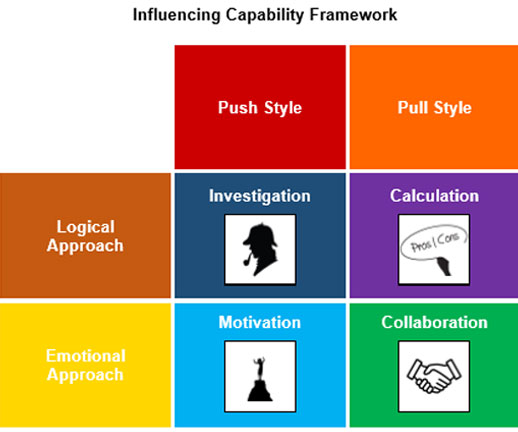Four Ways to Influence Anybody about Anything
Influence is the lifeblood of leadership. We’re all in the business of influencing and being influenced daily. Some people are better at persuading than others. We all use a favored influencing strategy to persuade; mostly we do this subconsciously. We also have a preferred way we like to be persuaded too, again, we are often don’t consciously consider how we like to be influenced.
In my book The New Influencing Toolkit: Capabilities to Communicate with Influence, I share with my readers a new Influencing Capabilities Framework. The book also has a diagnostic to determine your favored influencing strategy. There is also a 14-page Influencing Capabilities Profile Report you can do online.

Here below is the Influencing Capabilities profiles and skills Framework:
If you look at the framework above, you’ll notice that it has two dimensions: Push and Pull Styles and Logical and Emotional Approach. Let’s look at the Push and Pull Styles first.
A push style can be characterised by words and phrases such as: driving, proposing, giving information, blocking/shutting out, and taking the idea to the person.
On the other hand, the pull style is characterised by words and phrases such as: enabling, testing understanding, seeking information, building/opening up, and getting the person to come to the idea. Both are effective in the right situation and with the right person.
In terms of the two approaches, let’s consider the logical approach first. The logical approach in influencing includes descriptors like: facts, evidence, rational, structure, and measurement. The emotional approach would include words such as: feelings, perceptions, values, flexibility, and morale. Again, both work well in the right context.
As you can see from the Influencing Capabilities Profiles and Skills Framework, this generates four influencing strategies:
Inquisitive Investigator
Inquisitive investigators rely on logical presentations to win their argument and persuade. They are structured and methodical.
Someone well-known internationally that relies heavily on this type of strategy is former US president and environmental activist Al Gore.
Clear Calculator
Clear calculators like the investigator, use logic to make their argument. But they are less direct. They talk up the advantages of their argument and explain the perils of not adopting the change.
Someone who immediately comes to mind who used this strategy to great effect is former Great Britain prime minister Margaret Thatcher.
Mindful Motivator
Instead of using logic, mindful motivators will adopt an emotional approach to influence others. They are direct and generally motivate with stories, metaphors, and speeches.
The famous civil rights activist of the 1960s, Martin Luther King was a wonderful orator who used the motivation strategy to mobilise influence.
Collegial Collaborator
Collegial collaborators also use emotion to get their way. But they do this indirectly. Collaborators build teams and instil loyalty amongst their members to create cohesion and influence.
Mother Teresa engaged the hearts and minds of the people who volunteered their services to help the poor and homeless in the streets of Calcutta and other places in the world when she was alive.
Which one of these influencing strategies seems most familiar to your style and approach?
The key is to use all four strategies at the right time, in the right way, with the right people, for the right cause. Being flexible and adaptable is the way to go to become a great persuader.
The Influencing Capabilities Profiles provides you with an understanding of your preferred influencing strategy.
This is based on the four influencing strategies that make up the Influencing Capabilities profiles and skills Framework: investigating, calculating, motivating, and collaborating.
This report is designed to diagnose your influencing capabilities profiles and skills, and in turn develop your managerial influence. Besides providing you with your profile, it will give you valuable information on your strengths and opportunities for growth as an influencer.
It also includes hyperlinks to the different strategies used by four prominent and highly influential leaders. style of several famous people. This framework and report has proven to enhance the ability of managers to influence. It is based on The New Influencing Toolkit: Capabilities for Communicating with Influence, with over 60 practical techniques and methods to enhance each of the four influencing strategies.
This is an extract from Dr Tim Baker’s book – The New Influencing Toolkit. You can order it here.

